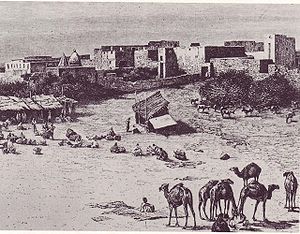CUSHITE KINGDOM wrote:
1. geledi had an alliance with many other clans to stay in power for their little period.
Xooga was Geledi, you collect tributes from all the other clans you rule them, learn how to read. Over a hundred years ain't a small time period pal
"The port of Mogadishu (Mogadiscio) was practically autonomous as C. Guillian noted the Zanzibar's Sultans like his customs came and went with the monsoons. The hinterlands of Mogadhishu was controlled by the Geledi clan, who's sultan contracted alliances with many other clans in the region between Shabelle and Juba river. Through much of the century, the Geledi alliance dominated the ivory trade that ran from Luk (Lugh) on the upper Jubba to Mogadishu; the
Geledi sultan also collected tribute from the agricultural clans, along the Shabelle river as far south as Brava. Only the powerful Biimaal clan situated in the hinterlands of Marka succeeded in resisting Geledi hegemony. The Sultan of Zanzibar sought to construct a fort in Mogadishu in 1870 he had to obtain approval of Sultan Ahmed Yusuf of the Geledi.
Source: General History of Africa IV. Africa in the 19th Century until the 1880's edited by J.F. Ade Ajayi
CUSHITE KINGDOM wrote:2. geledi controlled the hinterlands
Read buddy here's more than one source Geledi controlled Muqdisho itself
The Omani Empire was a network of ports, held together more by shared commercial interests than by a state structure (Cooper 1977: 32) Guillan described Sa'id's authority over Banadir as 'seasonal'; it came and went with the monsoons when his ships were able to anchor (Guillan, 1856: III, 185).
As far as Muqdisho was concerned, everybody knew the real power lay with Yusuf of the Geledi. Those merchants from Europe, Asia and America congregated in Zanzibar who directed their attention to the mysterious Sultan who controlled the inland trade routes.
Source: SOMALI SULTANATE. The Geledi City-State over 150 Years by: Luling, Virginia
" Farther south on the Benadir coast, however, the Sultan of Zanzibar claimed jurisdiction as the successor of Omani rulers. His claim was established, but was forced to share power with the local Somali rulers. The governor of the Benadir coast resided in Brava, which was therefore more firmly under Zanzibar rule. M
ogadishu, on the other hand, was really controlled by the sultan of the Geledi, and minor ports were in the hands of members of other clans"
Source: The Cambridge history of Africa: from c. 1790 to c. 1870 - Page 88
"When Christopher in 1843 and Guillen in 1847 visited Mogadishu, they found it more a Somali than an Arab town. In a population of about 4,000 there were only about 30 families of Arab origin and a few Indian traders. The rest were Somali, who had established themselves in the half-ruined houses of the Portuguese and greater Arab period. Unlike the Swahili of the southward towns, who were armed, like Arabs, with sword and dagger, these Somali carried spears and bows and arrows; and though they all professed to be Moslems and should therefore be able to read the Koran, they knew little or no Arabic.
Mogadishu, in fact, was virtually an outpost of a Somali kingdom with a population of some 150,000 centered in the Webi Doboi (Shabelle) country. Its real master was the Sheik at Geledi, a warrior chieftain who at need could mobilize at least 20,000 spears.
Source: East Africa and its Invaders From the Earliest Times to the Death of Seyyid Said in 1856. by: Coupland, Reginald pg 333-334
CUSHITE KINGDOM wrote:3. geledi power didnt pass banadir.
Again your either somewhat illiterate or just don't like facts
"When Guillain arrived on the Benadir in 1847, it appeared that the Geledi Sultan maintained an authority all the way to the Juba"
Source: Patterns of trade and politics in the Somali Benadir, 1840-1885 By Lee V. Cassanelli pg 57-58
"The port of Mogadishu (Mogadiscio) was practically autonomous as C. Guillian noted the Zanzibar's Sultans like his customs came and went with the monsoons.
The hinterlands of Mogadhishu was controlled by the Geledi clan, who's sultan contracted alliances with many other clans in the region between Shabelle and Juba river. Through much of the century, the Geledi alliance dominated the ivory trade that ran from Luk (Lugh) on the upper Jubba to Mogadishu; the Geledi sultan also collected tribute from the agricultural clans, along the Shabelle river as far south as Brava. Only the powerful Biimaal clan situated in the hinterlands of Marka succeeded in resisting Geledi hegemony. The Sultan of Zanzibar sought to construct a fort in Mogadishu in 1870 he had to obtain approval of Sultan Ahmed Yusuf of the Geledi.
Source: General History of Africa IV. Africa in the 19th Century until the 1880's edited by J.F. Ade Ajayi
they banadir you know might be mogadishu but its bigger than that.
